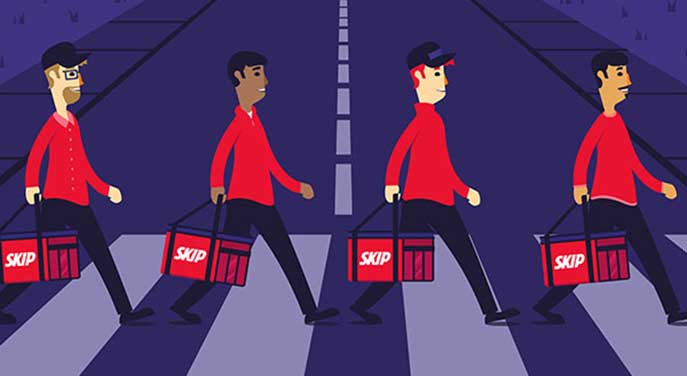 We recently learned that SkipTheDishes is building 38 dark stores across the country to support its e-commerce renewal. Its strategy includes selling food online like any grocery store.
We recently learned that SkipTheDishes is building 38 dark stores across the country to support its e-commerce renewal. Its strategy includes selling food online like any grocery store.
Company CEO Kevin Edwards claims the online food market will be worth $120 billion in a few years. That number is a little ambitious, but many observers believe online retail revenues could reach $25 billion by 2025. This could well mean that about 10 per cent of all the food purchased at retail in Canada could be bought online in just a few years.
Online food retailing is booming, no matter what some say about grocery shopping being an irreplaceable experience. The pandemic has made a compelling case for empowering a stranger to do the work for you, even at a fee. While some may find it more convenient, others don’t have a choice due to a chronic or permanent ailment.
The Angus Reid group reported that, in the last month, 19 per cent of Canadians ordered food from a retailer online. Before the pandemic, most online orders were for curbside pickup. Not anymore. The split between door-to-door delivery and curbside is almost 50/50. So offering a delivery service is increasingly becoming a competitive advantage.
For food service and restaurants, that user rate goes up to 28 per cent. In fact, SkipTheDishes is filling about 400,000 orders a month. In March 2020, before the COVID-19 pandemic, the number of orders per month was less than 20,000. If any company has an idea of how much online food ordering has grown, it’s certainly SkipTheDishes.
Like anything else, though, the way to support an e-commerce strategy is slowly evolving. Before the 2017 Amazon-Whole Foods deal, grocers considered e-retailing a nuisance, a distraction and even a way to cannibalize revenues.
When the American giant acquired Whole Foods, we saw an array of click-and-collects popping up. The click-and-collect model is more of a test balloon and not a full commitment to the development of a comprehensive online platform. The industry needed a decent push to commit to a more sustainable cybernetic approach. Over the last two years, that push has come from COVID.
Now, companies are thinking about the last mile, the middle mile and micro-fulfilment, like through the use of dark stores. A dark store is a location with the sole purpose of supporting a company’s e-commerce distribution strategy. The location doesn’t serve customers onsite – it’s designed to fulfil online orders only for a local market.
We expect more, but SkipTheDishes is the first company to explicitly point out that dark stores are very much part of its strategy.
 But anyone who has ordered food online knows that fees are often added to the bill, from $4 to $12 depending on where you live, the size of your order and which provider you use. SkipTheDishes intends to offer delivery for free for orders of at least $25.
But anyone who has ordered food online knows that fees are often added to the bill, from $4 to $12 depending on where you live, the size of your order and which provider you use. SkipTheDishes intends to offer delivery for free for orders of at least $25.
As the market matures, food delivery services will need to think about how to democratize the service to eliminate fees for those who need to order online. For people who are physically or mentally compromised or who need to quarantine, service charges are simply a regressive tax. As we learn to live with viruses and other public health challenges, access to online food delivery services can be an asset only if they don’t penalize those who have no other option, temporarily or permanently.
The labour market looks quite different from how it looked in March 2020. Based on some estimates, about 70 per cent of the Canadian workforce will be working from home at least five or more days a month by the end of 2022.
That means more of us will spend more time at home and will feel less inclined to leave the house to do errands like grocery shopping. Shopping online between video calls will be quite convenient for a growing number of people.
If you still don’t get the online food shopping phenomena, ask someone under the age of 40, preferably someone who has children. Then you’ll understand.
Dr. Sylvain Charlebois is senior director of the agri-food analytics lab and a professor in food distribution and policy at Dalhousie University.
Sylvain is one of our Thought Leaders. For interview requests, click here.
The opinions expressed by our columnists and contributors are theirs alone and do not inherently or expressly reflect the views of our publication.
© Troy Media
Troy Media is an editorial content provider to media outlets and its own hosted community news outlets across Canada.

